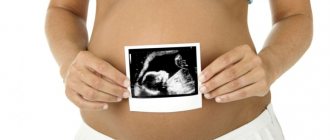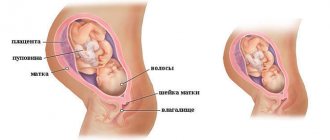How you feel at 13 weeks of pregnancy
With the beginning of the second trimester (which is 12 - 13 weeks of pregnancy), most women feel a surge of vigor and vitality. Mood improves, irritability and tearfulness disappear.
During this period, the expectant mother develops an appetite, and only some pregnant women continue to be bothered by nausea in the morning (it will finally go away by the 16th week).
During the 13th week of pregnancy, the placenta produces the hormone progesterone, which has a relaxing effect on smooth muscle fibers. This is necessary in order to reduce the tone of the uterus and prevent miscarriage, but the digestive organs also experience the same effect, which is why constipation occurs.
At the end of the first trimester, at 12–13 weeks of pregnancy, intensive preparation of the breast for lactation began. The number of lobules in the mammary glands increases, which is often accompanied by engorgement and soreness, and the breasts may become 1 to 2 sizes larger.
As for the nervous system, from the 13th week of pregnancy the balance of the processes of excitation and inhibition occurring in the brain is restored. And if earlier the latter prevailed (you felt drowsy, were slow, uncollected), now everything falls into place. In the second trimester, your performance will increase and you will easily cope with home and professional responsibilities.
External signs of pregnancy
Belly at thirteen weeks of pregnancy.
The uterus continues to grow and rise into the abdominal cavity. Now it can be felt through the abdominal wall. The rounded tummy is already becoming noticeable to others. The uterus becomes softer and more elastic, the amount of vaginal discharge increases.
Breasts at thirteen weeks of pregnancy.
It gets bigger and heavier. Painful sensations in the chest decrease or stop altogether, since the glandular tissue has stopped growing. With a gentle massage, colostrum may be released from the nipples.
Weight gain.
The growing appetite of the expectant mother can lead to a set of extra pounds. It is very important to control your diet and portion sizes. For pregnant women, there are norms for weight gain each week. In order not to gain extra pounds, you need to follow your doctor’s recommendations on the menu and physical activity.
Risk factors
The 13th week of pregnancy is very contradictory: on the one hand, everything is getting better, but most often it is during this period that expectant mothers experience candidiasis (thrush). The cause of the disease is candida fungi. They are present in the body of every person and in a passive state do not cause any problems, but under stress and immune failure they begin to become active and displace the normal microflora.
Signs of thrush are a feeling of sharp itching in the genitals and a curd-like white discharge. Do not rush to self-medicate: washing and douching with antiseptic agents will only bring short-term relief. And the lack of qualified medical care in the 13th week of pregnancy is fraught with increased uterine tone. In addition, a bacterial infection may be associated with candidiasis, in which case there is a risk of intrauterine infection of the fetus. The consequences of such an infection can be the most unpleasant.
How does the fetus change?
The 13th week of pregnancy is the period when the placenta has almost completed its formation. She has almost taken over the entire function of the corpus luteum and independently ensures the development of the baby. Its thickness ranges from 15 mm. It prevents the negative effects of most toxic substances on the fetus.
The most pronounced changes in the child’s body at this stage are:
- Active development of the central nervous system. A number of reflexes appear. The baby already shudders, bends over, puts his finger in his mouth.
- The fetal skeletal system continues to form. The spine is getting stronger and stronger. Calcium actively enters the bones, promoting their growth. Ribs appear. The limbs quickly increase in size.
- Multiple blood vessels are visible through the thin skin.
- The respiratory system continues to develop. The diaphragm moves, which after birth will take an active part in the breathing process.
- At this stage, the baby already has the rudiments of 20 baby teeth.
- The pancreas begins to synthesize its own insulin, and the first villi appear in the intestine, which are the main element in the process of parietal digestion.
The size of the fruit is from 12 to 13 centimeters, and the weight ranges from 25-30 grams.
Medical observation
If you have already registered with the antenatal clinic, then by the 12th - 13th week of pregnancy the first prenatal screening should be carried out. If for some reason this is not done, you need to urgently undergo an examination, which includes:
- Ultrasound examination of the fetus;
- Analysis for free b-hCG;
- Analysis for PAPP-A, or protein A.
Screening assesses the risk of neural tube defects, as well as chromosomal abnormalities associated with diseases such as Edwards syndrome and Down syndrome.
An ultrasound at the 13th week of pregnancy will show the shape and size of the baby, its movement. In addition, with the help of an ultrasound examination, the doctor will be able to assess the condition of the uterus, presentation and placenta insertion, and determine the approximate due date.
Also, at the stage of 13 weeks of pregnancy, it is necessary to do a clinical blood test and a general urine test. Based on their results, the risk of developing anemia, inflammatory and endocrine diseases is assessed.
What does a baby look like at 13 weeks of pregnancy?
It is similar in size to a small nectarine: its height is about 7-8 cm, weight is 15-20 grams. The head still makes up a third of the entire body, but in the future the proportions will even out. The baby is actively moving in the amniotic fluid, but the mother does not yet feel any movement. On an ultrasound, you can see the baby sucking his thumb, frowning, and yawning. He is already able to distinguish the taste of the food his mother eats and hear what is happening around him. His skin is still light and transparent, blood vessels and even internal organs are visible through it.
Recommendations
Advice on proper nutrition remains the same for the 12th – 13th week of pregnancy. Your diet should be healthy, balanced and include seasonal vegetables and fruits, animal protein and dairy products. Try not to overeat and control your weight.
If you are concerned about constipation at 13 weeks of pregnancy, add cereal dishes and foods rich in fiber (bran, raw vegetables) to your menu. Don't forget to drink enough fluids: ideally, drink at least 8 glasses of water every day.
Spend more time outdoors, do simple physical exercises, and if possible, visit the pool. Throughout the entire period of waiting for the baby (including in the 13th week of pregnancy), try to avoid crowded places. Be careful when choosing household chemicals. In case of illness, do not self-medicate, but immediately contact a specialist.
If there are no medical contraindications, do not refuse intimacy in the 13th week of pregnancy: it has a positive effect on the body and helps to harmonize relationships with your “other half.”
Possible complications of pregnancy
The likelihood of spontaneous abortion, which was high in the early stages of embryo formation, is reduced. However, even at week 13 it can be triggered by abdominal injuries, severe stress, use of teratogenic drugs, and infectious diseases. The threat of interruption during this period is usually associated with the following conditions.
Leakage of amniotic fluid
It occurs due to inflammatory processes against the background of isthmic-cervical insufficiency, trauma, and abnormal structure of the uterus. If you find a significant volume of transparent discharge with a sweetish odor on your underwear, you can check whether it is water or not using a special pharmacy test. And don’t delay in seeing a doctor. Timely treatment in a hospital allows you to maintain pregnancy.
Placental abruption
The placenta is completely or partially separated from the wall of the uterus. As a result, the fetus receives less oxygen and nutrients. This occurs due to injuries, high blood pressure, and polyhydramnios. Often observed during pregnancy after the age of 35. The woman feels sharp pain in the lower abdomen, and brown or scarlet vaginal discharge appears. At week 13, doctors are trying their best to maintain the pregnancy, because an urgent birth is not yet possible.
Feelings of the expectant mother
In the second trimester, a pregnant woman experiences new sensations. The growth of the uterus causes heartburn, problems with digestion and stool. Gaining weight and shifting the center of gravity leads to changes in gait and increases the load on the legs. Nagging pain appears in the lower back, associated with stretching of the ligaments that hold the uterus. Normally, the pain should not be severe or prolonged.
Reduced signs of early toxicosis.
In the second trimester of pregnancy, hormonal levels stabilize, so attacks of nausea and vomiting gradually go away. Sleep is normalized and overall tone increases.
Problems with stool.
Constipation and diarrhea in pregnant women can now be associated not only with the action of progesterone. The growing uterus puts pressure on the rectum, complicating bowel function.
Cramps in the calf muscles.
During the period of intensive growth of a child’s bone tissue, the body needs additional calcium. If the baby does not receive the mineral in sufficient quantities, he takes it from the mother’s bone tissue. A lack of calcium and magnesium in the body of the expectant mother can cause cramps in the calf muscles.
Reduced blood pressure.
By the thirteenth week, the formation of an additional placental circle of blood circulation for the expectant mother has already been completed, so a decrease in blood pressure is observed. Its increase may be the result of a malfunction of the kidneys.
Sex
The topic of sex worries all pregnant women throughout the entire pregnancy. And if in the first trimester expectant mothers, weakened by global hormonal changes and endless toxicosis, simply do not have the desire to have sex, then as their well-being improves, this desire returns and often with a vengeance.
Only a doctor can say whether or not you can have sex, after studying all the tests and examination. If there are no threats or risks, then there is no reason to deny yourself this pleasure.
As a rule, prohibitions on sexuality do not last forever. If now, for some reason, the doctor recommends abstaining, then it is better to do so.
Sex should not be had during the entire period of pregnancy in rare cases. One of them is the diagnosis of placenta previa. Sexual intimacy with such a diagnosis can become fatal, causing uterine bleeding and placental abruption.
Ultrasound at the thirteenth week of pregnancy
An ultrasound at the thirteenth week of pregnancy is part of the screening. This study is aimed at identifying pathologies of fetal development and the presence of chromosomal abnormalities. The doctor evaluates the overall development of the baby’s organs and systems, and also determines visual markers of chromosomal abnormalities. The thickening of the collar space and the size of the nasal bones are recorded.
During the first ultrasound examination, the specialist will clarify the gestational age and record developmental parameters. The expectant mother can see the baby's head, arms and legs, hear the little heart beating, and take the first photo of the baby. The placenta, ovaries, cervical canal and cervical condition are also examined.
Lifestyle of a pregnant woman
Healthy diet.
During the period of active growth of muscle mass and strengthening of the child’s skeletal system, it is important to choose foods with a high content of calcium, magnesium, zinc, protein and other vitamins and minerals. Lean varieties of meat and fish, liver, nuts, dairy products, vegetables, fruits and herbs should form the basis of a healthy menu for the expectant mother. Meals should be fractional: often, but little by little.
Suitable vitamins.
During this period, you need to choose the right nutritional supplements for pregnant women and help your body bear a healthy baby. The doctor may prescribe additional supplements of iron, folic acid, calcium, vitamin D, or choose a complex drug.
Sex life.
Changes in hormonal levels in the second trimester increase libido in pregnant women. The only contraindication to having sex is the threat of termination of pregnancy. If everything is fine with you, sex will help improve a woman’s emotional background and strengthen the bond between parents.
Physical activity.
In the second trimester, the woman gradually returns to her usual life. If physical activity has always been present in life, then there is no reason to give it up now. The load can be adjusted based on your feelings. For those who do not like the variety, it’s time to find activities that will bring pleasure and have a beneficial effect on the entire body. A simple set of yoga exercises, dancing or water aerobics will help relieve tension in the body and strengthen muscles.
A favorable time has begun for parents and their unborn child. There is no reason to worry or worry, the main thing is to follow the doctor’s recommendations, watch your diet and walk more in the fresh air.
(0 ratings; article rating 0)
Share Share Share
13th week of pregnancy: what you need to discuss with your doctor
- Why does pain sometimes occur in the pelvic area? Sometimes, pain from overstretching the ligaments of the growing uterus radiates to the pelvic area, but it would be a good idea to consult a doctor to find out for sure that everything is within normal limits.
- Is your rate of weight gain normal? If not, what needs to change to avoid gaining too much or too little weight?
- What are the features of twin pregnancy?
What does an ultrasound show?
If the obstetrician-gynecologist has not yet prescribed the first planned ultrasound examination of the fetus, then it should definitely be done at this time. The best time for it is between 10 and 14 weeks of pregnancy.
Indicators obtained during the study:
- Gestational age;
- Probable date of birth;
- Condition of the uterus and placenta;
- Number of fruits;
- The size of the fetus, its activity, developmental features;
- The presence or absence of prerequisites for chromosomal developmental abnormalities.
Since this week it is possible to evaluate fetal malformations, ultrasound is included in the screening program performed every trimester of pregnancy.
How does the uterus change at 13 weeks?
The upper pole of the enlarged uterus is located above the pubic bones. It has already gone beyond the pelvis and is easily palpable in a lying position in the form of a dense round formation. A growing uterus can cause a pregnant woman mild negative sensations, as the ligaments that support it are under increased stress.
Uterus parameters:
- Height – 13 cm;
- Width – 10 cm.
From now on, measuring the height of the uterine fundus will be a routine procedure when visiting an antenatal clinic. These results will be entered into the pregnant woman’s exchange card.
Sometimes a woman experiences unusual symptoms when a short-term tension is felt in the lower abdomen, less often a slight cramping pain. This is the uterus becoming toned, and soon relaxes again. Such contractions will be repeated until childbirth, only they will become less frequent, and the uterus will be soft and elastic.
In order for such “training contractions” to go away, it is enough to lie down and rest a little. Such conditions are provoked by walking in high heels, carrying heavy objects, and stressful situations. The doctor may recommend suppositories with papaverine or the drug Ginipral.
Screening
There are ultrasound and biochemical screening tests. The first screening during pregnancy is carried out at 11-16 weeks, it is likely that you will be sent for an ultrasound and tests this week.
Screening includes a number of tests and studies that help identify women at risk for developing chromosomal diseases in the fetus. To do this, it is imperative to look at the collar zone of the fetus (assessing its thickness or transparency), its nasal bone (presence or absence and size), determine the presence or absence of physical defects, as well as the level of hormones and proteins in the mother’s blood. Based on the data obtained and the age category of the pregnant woman, a conclusion is made about the likelihood of this woman having a sick child.
The high-risk group includes pregnant women whose risk of developing fetal abnormalities, based on screening results, is 1:350 or less. But you should know that a risk factor is not a guarantee of pathology. Screening allows only to admit a high probability of a chromosomal disorder and nothing more.










